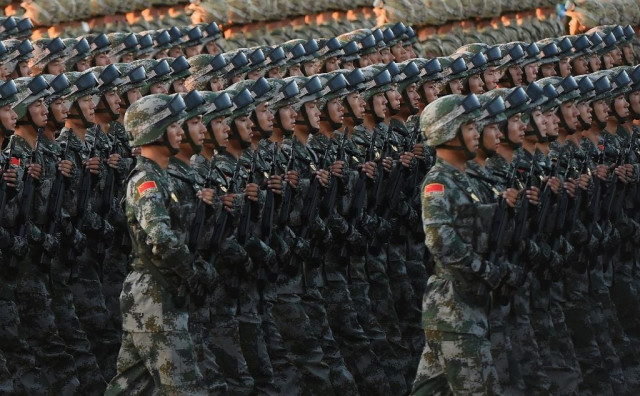The spirit of war
The veterans collectively disliked one of their comrades who was on the heavy weight side

Chinese soldiers conduct a practice at dawn ahead of a military parade later in the morning, at Tiananmen Square in Beijing, on September 3, 2015, to mark the 70th anniversary of victory over Japan and the end of World War II. PHOTO: AFP
“In memory of three thousand fighting men
who came down
this gorge
to battle in the great war
1914-1918
and, more especially
of those,
who never returned
this better way
was made by
the Punjab Government
and
the District Board of Shahpur
and opened by
His Excellency
Sir WM Hailey KGCSI MO GCSI GCMG
Governor of the Punjab,
April 1st, 1928”.
Personally, I never got to know anyone who had participated in the World War. I was, however, aware that some people from our village had been part of the army at the time. A cleric who was influenced by Majlis-i-Ahrar used to condemn their support to British Empire in his Friday sermons and their role in prolonging the imperial rule. During his address, he had a tendency to name people in his intense moments. I guess it had more to do with his rather frenzied predisposition than any religious creed.
I met many veterans of the World War II, however. Some of them were close family members. My grandfather had been in the army, but he had mostly been posted in what is currently India. One of his brothers, however, was a prisoner of war in Japan. He and one of his cousins had joined the army voluntarily. After a brief training, both were sent to the Eastern Front. He had many perturbing stories to tell. On the way to the war theater, his ship was sunk. He had spent many days on a lifeboat in the sea before he was rescued. I first heard names of Java and Sumatra from him. His ship had been sunk somewhere in that region. He and his mates had apparently received quite dreadful treatment during their captivity. Starvation and physical torture, they said, were commonplace. Those considered deserving the worst punishment were to hung alive against rubber trees by driving nails in both their hands. He also told stories of Japanese courage during the war. One story was about Prince of Wales, the ship sunk by Japanese air attacks. He believed that Japanese soldiers were promised an enjoyable life after death by their king and that this was source of their courage in the battle. He remained quite frail physically till his death and believed that this was on account of the sufferings he had faced during his captivity. When he returned after the war, his aunt was waiting for her son and expected them to arrive together. Her son never returned. She always had a little disinclination towards him as she believed that he had led her son to enlist. He spent many months traveling with a Peer Sahib to overcome the maladies he believed had been caused by evil spirits. One wonders if those were ghosts of his memories and his dead mates. In some ways, the experience of war had made him tough. He had a habit of facing the challenges life threw at him without complaining. He always worked hard.
There was a sense of camaraderie among veterans who had been prisoners of war. I noticed the warmth they showed to one another in their encounters. Many of them had health issues and were generally on the low weight side. They collectively disliked one of their comrades who was on the heavy side. Their comments implied that he had been an informer and had been rewarded by the Japanese in the form of extra food and better living conditions.
Other people had served in the Middle East or Europe. One of them had been stationed in Scotland. He was enthused during a conversation with one of my colleagues who was visiting from Edinburgh in 1990s. In true British spirit, he talked to the Scotsman about the wet weather of his country. He described his experience as living in water. He had mixed feelings about not having had the opportunity to engage the enemy. He was grateful enough that he had escaped the trouble but also sad that his life had not been worthy of a soldier during a war.
I met another veteran in Lahore. He was originally from our village but had bought some land in Sindh and lived there. He had an issue with his army pension and was visiting Lahore to sort it. He said he had received belittling treatment from clerks in the office that dealt with the matter and was bitter on two counts: he believed that he deserved respect because of his age and also because of his valour during the war. In spite of my sympathy for him, I was confused. I had seen clerks meting out similar treatment to retired soldiers from Pakistan Army and here was someone who had fought a war for a colonial power. He obviously was oblivious to the distinction. In his fighter’s spirit, he narrated the story of a battle against Italians where his regiment had to climb a hill while Italians had the advantage of high ground. The soldiers, he said, had egged one another on for the honour of all Indians and had taken the peak in spite of heavy casualties. The story was illuminating. It helped me understand the viewpoint of all the fighting soldiers of the world. The wars they are fighting have to have meaning for them.
I do not think this sense of commitment to your side is limited to any part of the world. A few years back I met a lady in England whose forebears came from a region on the border between France and Germany. Three generations in the family had fought in wars between the two countries but each time from a different side.
Most people from our village who fought the World War II have passed away. Many of them went without narrating their stories. Some of them could sense at some stage that the time for their stories was over. Others, being naive, did not see that.
Dr Muhammad Ayub is a psychiatrist and currently works as associate professor in Queen’s University, Kingston Canada. He is originally from Soon Valley, District Khushab
Published in The Express Tribune, September 5th, 2016.



















COMMENTS
Comments are moderated and generally will be posted if they are on-topic and not abusive.
For more information, please see our Comments FAQ